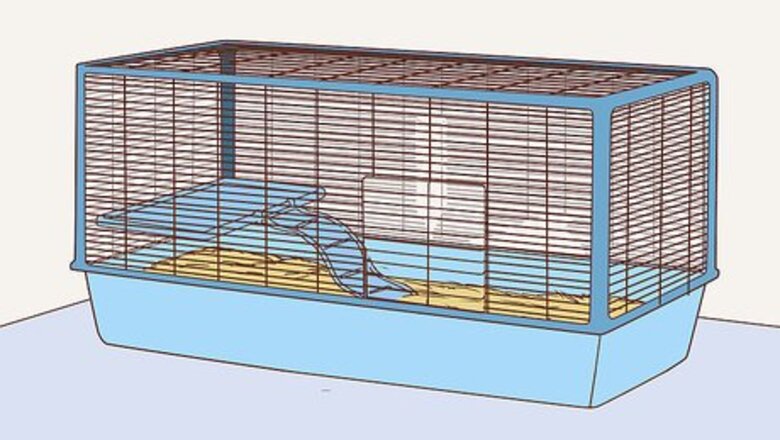
views
Setting Up Their Cage
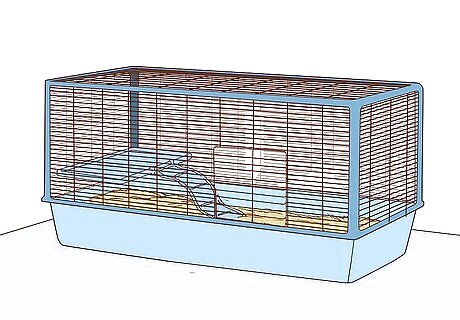
Purchase a suitable cage. Provide at least 10 square feet of living space for two guinea pigs. The more space you provide the happier your guinea pigs will be. Spacious cages prevent conflict between guinea pigs (especially boars), and reduces the risks of obesity by providing adequate room for exercise. Test a few cages and look for one that you can clean easily. Can your hand enter the cage easily? Can you brush inside the cage? Make sure the cage is light enough to keep your guinea pig happy. The cage should also contain a dark corner, or a mini-house, where your guinea pig can hide or sleep when it doesn't want to interact with the outside world. There should be one hide per guinea pig. Place the cage in a room with a stable temperature. Guinea pigs can't stand high temperatures or sudden temperature drops or increases. C & C cages are perfect beginner cages. They are inexpensive, provide adequate room, and are expandable.
Line the floor of the cage with an absorbent guinea pig bedding. Aspen or kiln-dried pine shavings, paper bedding, or fleece are a few suitable options to choose from. Change their bedding regularly to prevent odor or ammonia build-up. Line the base of the cage with newspaper or puppy pads for extra absorbency. Do not use cob bedding, straw, or cedar shavings/chips.
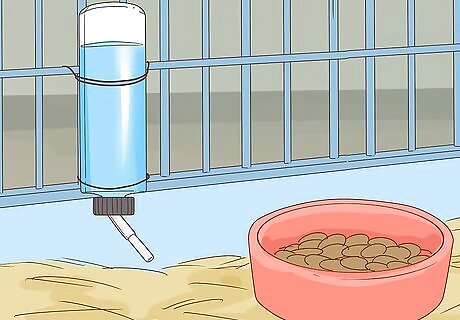
Install a food station and water dispenser. Food and water dispensers for guinea pigs are widely available online and in most pet stores. Look for a sturdy model and make sure that your guinea pig's food bowl or water bottle is big enough to feed the number of animals you own. Place these items in an accessible place. Your guinea pig will need two ceramic food bowls to hold their vegetables and pellets separately. You can alternatively set up a water bowl instead, however, your guinea pig's bedding may fall inside the bowl if it's exposed to loose bedding such as wood shavings. A water bottle is a cleaner option. You might not see your guinea pig drinking often. It’s perfectly normal as they also extract water from vegetable matter.
Give your guinea pigs something to chew on. Guinea pigs need to keep their teeth ground down. Provide your guinea pig with chew toys or pet-safe wood blocks. Don't use anything other than orchard wood or a chewing treat from a pet-shop. Other types of wood can be toxic and could harm your pet.
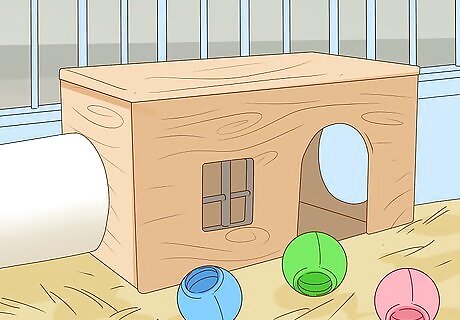
Add a few toys. Guinea pigs are playful animals and welcome to intellectual stimulation. You should be able to find ready-made toys, such as balls or tunnels, in most pet shops. You can also try to make your own. Here are a few ideas: Try putting fruits and vegetables on a string and hang them from the cage. Build a little cardboard house where your guinea pig can play. Make an obstacle course with various objects.
Taking Care of Your Guinea Pig
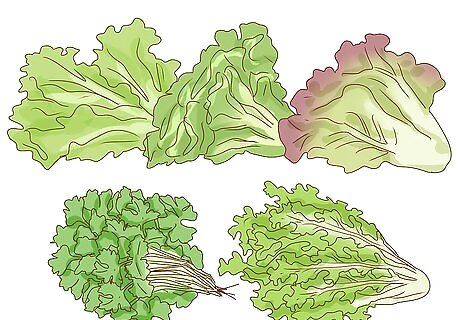
Provide a balanced diet. The foundation of your guinea pig’s diet should be grass hay. It’s a good source of fibres and keeps their teeth ground down. It’s important to let your guinea pig have constant access to grass hay and other sources of food. Pellets sold in pet shops is heavily debated. Avoid alfalfa pellets with large concentrations of calcium, a potential cause of urinary infection. Also avoid muesli to prevent selective feeding. Plain guinea pig pellets that are fortified with vitamin C are best. Provide 1/8 cup of pellets per guinea pig a day. There are several types of grass hay, with timothy, orchard, and meadow being the most popular varieties. You can find them in pet shops or at equestrian centers. Separate the hay from the bedding. You don’t want your animal to eat and go to the toilet in the same place. Provide your guinea pig with one cup of fresh vegetables a day. Bell peppers, kale, parsley, celery, cucumber, carrots, tomatoes, bok choy, fennel, and peas are a few suitable vegetable options. Variety is key to a good diet. Feed your guinea pigs fruit in limited amounts. Fruits are high in sugar, and can lead to health problems if fed in large quantities. Look for food enhanced with vitamin C, as Guinea pigs can't produce it themselves. They also need high levels of vitamin A, which can be found in carrots. Bell peppers can be fed daily to boost your guinea pig's vitamin C intake. Parsley is another herb that is high in vitamin C Change your guinea pig's water daily to prevent algae growth. Avoid potatoes, rhubarb, avocado, tomato leaves and flowers. They are poisonous to guinea pigs.
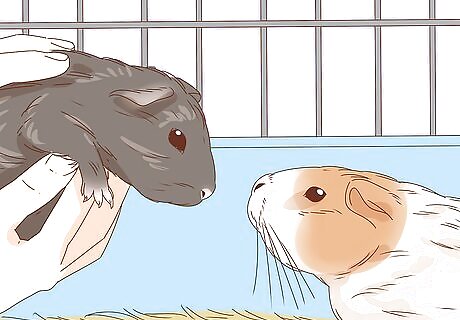
Introduce a new friend. Guinea pigs are very sociable and love company. Keep guinea pigs of the same sex or already spayed/neutered pairs. Guinea pigs are social animals but they aren’t above fights. Introduce a new guinea pig slowly. If you find that your guinea pigs are fighting, separate them with a wire shelf, which allows them to see and smell each other, but prevents them from fighting.
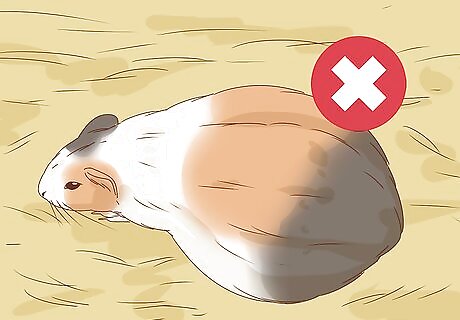
Do not allow females to become pregnant. Pregnancy and especially birthing is hard on females. One in five females that are bred will die as a result of complications during pregnancy or birth, or as a result of toxaemia after birth. If you wish to have baby guinea pigs, make sure to talk with your veterinary surgeon beforehand. You should have room for the babies and enough money to feed them in the future.
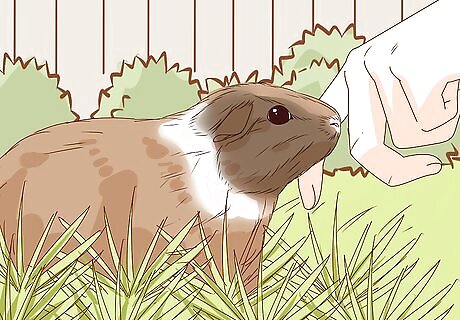
Play regularly with your pet. Guinea pigs love action and will welcome a good playing session with you. Hosting floor time is a good way to keep them fit and intellectually stimulated. There are a few things to look for: If you take them in the garden, make sure that they cannot escape. Also make sure that there is no predator such as cats. Let your guinea pig eat a bit of grass outside. It's very good for them but don't let them eat too much at first. Rich grass might trigger diarrhea. Make sure that the temperature is right. It should be between 60-70°F or 15-21°C. Don’t forget to wash your hands after playing to avoid bacterial contamination.
Looking After Their Health

Find a veterinarian. Don’t wait for a problem to happen to bring your guinea pig to a specialist. These tiny animals require regular check-ups to detect potential health issues. Most veterinarians will take care of your pet but only a few specialise in guinea pigs. Look for an exotic vet that treats rodents online or in your phone book. Bring your guinea pig for a regular check-up at least twice a year. Your veterinarian will probably recommend to neuter your male guinea pig during the first visit. This might cost a bit of money but will make your guinea pig quieter and happier in an enclosed environment. The veterinarian will also treat your guinea pig for external and internal parasites such as worms.
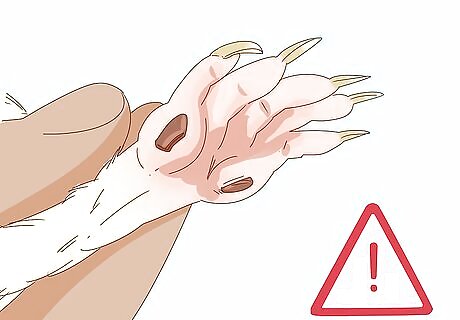
Constantly check for injuries. Older guinea pigs sometimes have feet wounds. If this happens, see a veterinary surgeon and get softer bedding or spread out a soft cloth at the bottom of the cage. Observe your guinea pigs actions. If anything seems wrong, don't take too long to act. A small infection can be lethal. Don’t forget to cut the nails of your guinea pigs as they might be a cause of injury. Remember to be gentle. Don't give them medicine unless prescribed by a veterinarian. You might kill your guinea pig.
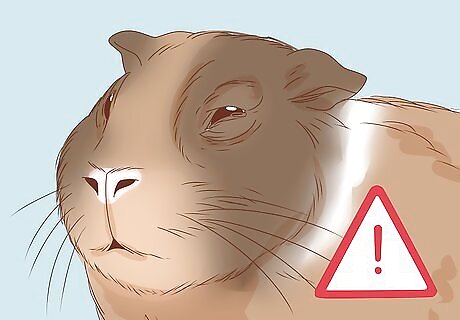
Be on the look-out for worrying symptoms. If you notice crusty or swollen eyes, dandruff, inflamed ears or nose or irregular breathing, call immediately your veterinarian. You should also bring your guinea pig if it’s behaving erratically or if you notice anything uncommon. Check their front teeth. Only veterinarians should take care of overgrown teeth. Their life expectancy can vary a lot. They can live between four and eight years. If you notice something unusual, separate your guinea pig immediately. You don’t want to spread a contagious disease. Weight your animals regularly to monitor their health. This will tell you if they are well and if you are feeding them enough or too much. An adult guinea pig should weight around 700 to 1200 grams. If your animal smells bad, go to the veterinarian. Guinea pigs are clean animals and shouldn’t be washed, except if they are really dirty.

















Comments
0 comment